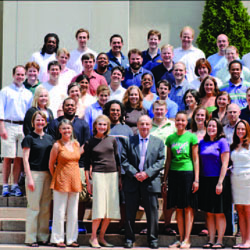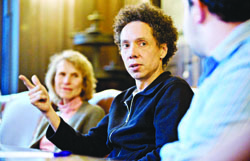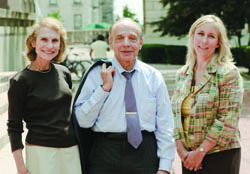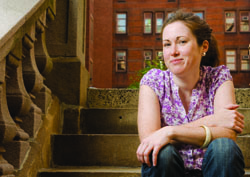The Power of Independent Thinking
TC's Klingenstein Center is developing leaders who improve education by constantly questioning it-'"and themselves
Halfway through her year studying at TC’s Klingenstein Center Independent School Leadership, Eileen Neville had often been excited, exhausted and elated. But the guest lecturer on a wintry afternoon last February promised to be something truly special.
The Klingenstein Center
Yet perhaps the most important component of Klingenstein programs is the premium they place on introspection. “Truly good leadership requires a willingness to constantly consider alternatives to result in better quality,” says Pearl Rock Kane, the Center’s longtime director. “We are always looking at ways to improve, both in what we offer our students and in what they take back to their classrooms and schools. That can only happen by building in opportunities and time for reflection.”
And truly meaningful reflection, in Kane’s view, involves listening to different perspectives.
“You don’t learn much from people who consistently agree with you,” she says. “The way to expand understanding and improve the quality of decision-making is to invite the perspective of people with varying views.”
All of which may explain why the guest lecturer coming to Eileen’s Neville’s class that day was New Yorker writer Malcolm Gladwell, best-selling author of the books Blink and The Tipping Point. “He’s thoughtful about such a wide variety of subjects,” Neville said. “Instead of saying, ‘I wonder why that is?’, he’s the guy who goes and gets to the bottom of it.”
Gladwell is also the guy who, in The Tipping Point, suggested that Ivy League universities should be shut down. Yet the Klingenstein Center
During his visit, Gladwell admitted that his comments about the Ivies were at least partly facetious, though he didn’t back off his strongest beefs.
“I object to the hoarding of resources,” he said, citing the multi-billion dollar endowments of some universities. “And I object to the way in which those kinds of brand names distort educational priorities in high schools, with kids thinking that that’s all that matters, and how they serve as a kind of inappropriate marker in the workplace. In fact, my corollary recommendation is that once you have graduated from college, you should not be allowed to tell anyone—and no one should be allowed to ask—where you went to school.”
Still, when Klingenstein student Danielle Passno, a Dartmouth Canada Klingenstein Center from her job as the International Student Coordinator at The Williston Northampton School in Massachusetts
A PUBLIC RAISON D’ETRE
The Gladwell visit also suggests an answer to one of the most commonly asked questions about the Klingenstein Center Klingenstein Center Deerfield Academy
Today, the Klingenstein Center
“In any one of our cohorts, you’ll find educators who represent the true breadth of independent schools—from schools that serve the poor, from urban schools, suburban schools, girls’ schools, boys’ schools, boarding schools, experiential schools, religious schools, no-tuition schools, second chance schools,” Kane says. “What all these schools have in common is the autonomy to meet the needs of their constituencies without state interference. Private schools can bring in a poet or an artist, and are unconstrained by bureaucratic regulations.”
They can also choose their students and faculty from a broad spectrum without being bound by geographic limitations. They can put together communities that reflect racial, religious, socioeconomic and cognitive diversity—and a diversity of students’ talents, too. Indeed, Kane says, even private schools that might once legitimately have been called elitist no longer fit that description.
“Private schools are changing to be more representative of society in general—for example, Andover Scarsdale
But in Kane’s view, the most important reason Klingenstein belongs at TC has to do with the sense of possibility that independent schools inspire—and thus the kind of people they attract.
“I have enormous respect for people in independent schools,” she says. “They’re not running away from anything, they just want to be effective in what they do. They come here believing in the transformational power of schools—that education is the way to change society. Whether they’re classroom teachers or school heads, they leave with a missionary zeal to make a difference—and we provide them with the knowledge and skills that will help them be successful.”
SATISFIED CUSTOMERS
There seems to be no lack of Klingenstein alumni who validate that claim. More than 500 of them showed up in February 2008 for the special dinner that celebrated the Center’s 30th anniversary and honored John Klingenstein with a Lifetime Achievement Award.
For Nigel Furlonge, who’d originally expected his foray into the profession to be brief, the Klingenstein two-week summer program was “the moment when I truly understood how challenging, difficult and rewarding this career is and could be.”
Furlonge, who describes himself as “the first faculty member of color ever” at the Holderness School , in Plymouth , New Hampshire
“Holderness is in rural New Hampshire
“At Klingenstein, I learned more broadly about how academic and learning environments could be designed for schools that truly engage questions surrounding educational excellence, educational access and educational equity,” he says. “To be part of such intentional conversations really changed my thinking about what role I could play as an educator.”
So much so, in fact, that three years later, Furlonge agreed to work with the Summer Institute as a co-lead teacher for both diversity programming and the history curriculum group, and five years later, he was back as a Klingenstein Fellow for the year-long Private School Leadership program. In the meantime, he had moved on from Holderness to the St. Andrew’s School in Delaware Lawrenceville School near Princeton , New Jersey
In each of these roles, Furlonge says, he found that his Klingenstein experiences have given him the ability to navigate everything from pedagogical challenges to legal issues to questions of health and wellness. “We spent time thinking and learning about all these things through case studies, through readings, through essays,” he says. “It’s not that you become an expert in every area. That’s not possible. But you do walk away with a sense of the critical, substantive or salient questions that then help you, hopefully, to make more thoughtful, reflective decisions.”
The result can be life-changing. For example, when Eileen Neville left the Williston Northampton School
By March of her year-long program, she had interviewed for a job as Upper School Director of Studies at the Charlotte Country Day School , a K–12 school in Charlotte , North Carolina
“You come in there knowing you want to get to the next level, but then this whole other side of education is revealed to you,” she says. “I was passionate before, but Klingenstein helped me to see where my passions lay.”
Aimeclaire Roche also worked at St. Andrew’s, first as a teacher of classical languages, then in academic administration, and then as Director of College Counseling. The work was rewarding, and after some years in the latter role, Roche began considering a next move.
When she heard that the Klingenstein Center
The reality did not disappoint. She cherished her classmates (“We all lived together, and we all worked together—even our individual work always had a collaborative component.”); she respected the work ethic (“Because of the condensed academic schedule in the summer terms and the way we pursued our research projects while back at our own schools, for a year and a half we worked 18-hour days and got to keep only one carefully chosen personal hobby.”); and she especially valued the alternative perspectives on education.
For one of her first assignments, Roche shadowed a student at a vocational high school. In an American educational history course, she dug into the federal No Child Left Behind Act: “You begin to weigh the benefits of having that kind of benchmark. What are the challenges? And how can independent schools and public schools work together in some way?” And throughout it all, there was the backdrop of New York City
For their final project, Roche and other members of her cohort followed a head of school for two days and analyzed the ways in which that leader’s work conformed to or departed from various leadership modes and frames. That turned out to be particularly fortuitous, because right before her second summer at Klingenstein, Roche was offered the job of Assistant Head at Groton School in Massachusetts
“I don’t know how I would have made that move without my leadership academy colleagues,” she says. “They were the wise constant in the midst of a large transition. If I went back to my phone bills that first month, I’m sure they reflect numerous calls across the country and to Canada
LEADING THE LEADERS
By all accounts, two constants have defined the Klingenstein Center
“John’s humility and respect for educators and teachers models characteristics we aim to develop in our students,” says Kane. “John knows what we’re trying to accomplish and he trusts me and the College to make sound decisions. He is a supportive advocate and great source of strength. He also makes an effort to visit classes and meet with our students directly so he sees what we are doing firsthand.” (Read more about John Klingenstein at www.tc.edu/news/5876.)
The second is Kane, a seemingly tireless woman with a dazzling smile who still teaches in every session of every Klingenstein program, and who, at the Center’s many parties and outings, can usually be found at a table with students, laughing as loudly as any of them.
Kane herself was in the first class of Fellows the Center graduated. She had been teaching at Dalton , a top New York City private school, following stints in the City’s public school system and teaching in Smith College
Her experience as a Klingenstein Fellow left her wanting more. “The program at that time was being run in a very casual way,” she says—a view her thesis advisor, then-TC President Lawrence
“I said, ‘You don’t really want me—you want someone who has been fully immersed in the private school sector,” says Kane, who herself is a product of public schooling and earned her undergraduate degree at City College
Over the years, Kane has sharpened the Center’s emphasis on social justice and defined “leadership” to include both a pedagogical focus and an administrative one.
“We want our graduates to be highly knowledgeable about the work of schools, which is teaching and learning, so we require applicants to have a minimum of three years experience in the classroom, and they study cognitive development and curriculum when they get here,” Kane says. “An assistant head or an admissions director with 20 years of experience would not be accepted without teaching experience.”
The Klingenstein Center
Of course, it probably doesn’t hurt morale for educators, however experienced, to attend a program that can connect them with an influential network of teachers selected on the basis of a national competition; that has a summer program housed at the Lawrenceville School
“The ultimate purpose of the Klingenstein Center
At Groton Groton La Jolla , California Groton Klingenstein Center
Published Wednesday, Jan. 7, 2009



